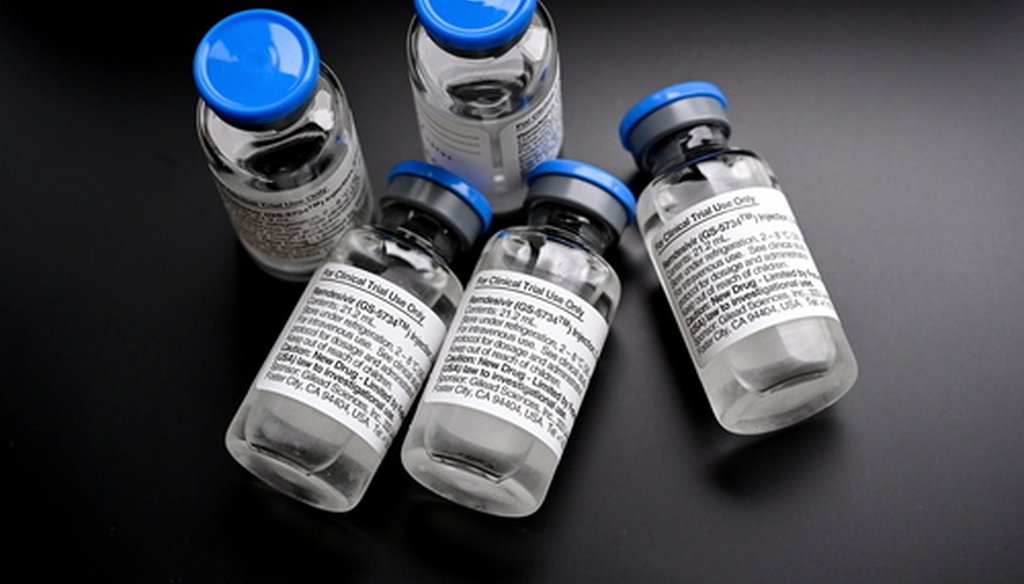

Our only agenda is to publish the truth so you can be an informed participant in democracy.
We need your help.


When the drug that would come to be known as remdesivir was identified as a possible treatment for the Ebola virus, the Department of Defense paid Gilead to develop it, to the tune of $34.5 million today
A $6 million grant from the National Institutes of Health was awarded to researchers at the University of North Carolina to speed the development of remdesivir
NIH also sunk $30 million into the clinical trial to observe how remdesivir acted against COVID-19 earlier this spring
Both the Department of Defense and NIH are federal agencies whose budgets stem from tax dollars
We may be months — at least — away from a vaccine to protect against COVID-19, but in the meantime the public is turning its eyes to drugs that could be used to treat it.
Among the first to be lauded as a possible solution was the antiviral drug remdesivir, which attacks the coronavirus to prevent it from making copies of itself and spreading. A clinical trial run in April found that patients who took the drug were more likely to recover from the disease — and do so faster — than patients who took a placebo pill.
But as excitement about remdesivir amps up, criticism has followed over the price that Gilead Sciences, the drug’s manufacturer, wants to charge for it.
U.S. insurers, including Medicare and Medicaid, will pay $3,120 for a five-day course of the drug, while other developed countries will pay about a third less because they’ll purchase from generic manufacturers to which Gilead has licensed production.
The move has angered many, including the progressive advocacy group and think tank Public Citizen, which tweeted on June 29, 2020 about the price declaration, writing, "Taxpayers spent $70,000,000 to develop this drug. It should be in the public domain. Instead, Big Pharma is robbing us blind."
Parts of the tweet, course, are opinions. But the $70 million claim is stated as a fact.
How much did taxpayers spend to develop remdesivir?
Let’s dig in.
To back up the organization’s claim, Peter Maybarduk, Public Citizen’s Access to Medicine director, sent a May 7, 2020 post published on their site titled, "The real story of remdesivir."
Amid the worldwide Ebola outbreak in 2015, the U.S. government partnered with Gilead to identify a drug that targeted the Ebola virus and was successful in blocking the infection in Rhesus monkeys.
That drug would later come to be known as remdesivir. In 2017, a U.S. Department of Health and Human Services report noted that an entity within the Department of Defense would cost-share with Gilead for "continued development of this product," noting its antiviral activity against a number of viruses, including coronaviruses.
The Department of Defense has spent $34.5 million so far on this effort.
Also in 2017, the National Institutes of Health issued a $6 million grant to researchers at the University of North Carolina to speed the development of remdesivir.
And as the novel coronavirus made its way into the world, the National Institute of Allergy and Infectious Diseases, a division of NIH, announced it would funnel $30 million into the aforementioned clinical trial for remdesivir.
Since the Department of Defense and the National Institutes of Health are funded through federal taxes, these three payments add up to what Public Citizen claimed.
Public Citizen wrote that taxpayers paid $70 million to develop remdesivir.
Three separate projects from agencies that are funded by taxpayer dollars, adding up to $70 million, have commenced since 2015.
We rate the claim True.
Milwaukee Journal Sentinel, "Testing finds remdesivir helps COVID-19 patients survive and recover faster," April 29, 2020
STAT, "Gilead announces long-awaited price for Covid-19 drug remdesivir," June 29, 2020
Tweet from Public Citizen, June 29, 2020
Email exchange with Peter Maybarduk of Public Citizen, July 15, 2020
United States Army Medical Research Institute of Infectious Diseases, "Antiviral compound provides full protection from Ebola virus in nonhuman primates," Oct. 9, 2015
U.S. Department of Health and Human Services, "2017-2018 Public health emergency countermeasures enterprise (PHEMCE) strategy and implementation plan," accessed July 15, 2020
Award summary for Gilead Sciences in the amount of $1.2 million
Award summary for Gilead Sciences in the amount of approximately $33.3 million
University of North Carolina, "Gillings School researchers receive $6M+ grant to fight infectious diseases," Aug. 31, 2017
Wall Street Journal, "Covid-19 drug remdesivir to cost $3,120 for typical patient," June 29, 2020
In a world of wild talk and fake news, help us stand up for the facts.
